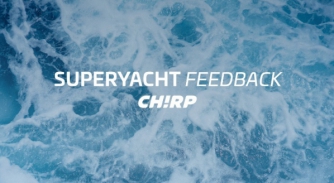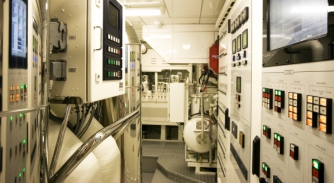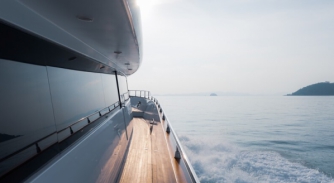Attitude trumps training!
Oscar Siches on the qualities that make for a successful team on board…
We had three sets of uniform each. Luckily, part of the upgrade to M/Y Santa Cruz Tres was fitting two 6kg Miele washing machines and two dryers aboard, a decision I made following my experience as second engineer on Mr Azcarraga’s M/Y Azteca a couple of years earlier. With the boss and with charters on board, both machines were just enough to cope with the washing needs, once we had also established washing machine watches through the night! It gave us three extra cycles a day and made it possible to give the expected service.
It was demanding, but it was also the standard. It was 1988, no ILS, no Class IV, no mobile phones, no internet. Captains dealt with owners directly, and most shipyards did not admit a captain access to the yard until two to three months prior to the yacht’s delivery.
Why am I reminding you of this? Martin Redmayne recently cited the increased complexity of modern boats and boat size as a key factor of that complexity. But captain-crew-owners/guests is still THE axis that justifies the yachting fleet and everything that revolves around it. On the uniform issue, I am sure some self-called crew experts will start a discussion in LinkedIn, WhatsApp and/or other social media platform demanding new rules to limit the number of uniform changes a day for the benefit of the crew, easing the exhaustive pace and ensuring mental stability...
The topic of crew was recently discussed in an article on Superyacht News, ‘The Elephant in the Room’. I think there is something missing in all these crew discussions, contributors to which include crew selection agencies, training companies, crew experts (you are not a crew expert having been a stew for two seasons …) and too much focus is placed on making crew “feel valued, skilled and motivated”. And then, the one that really infuriates me: the crew mental help experts. Mental help, for your mental health. Thank god I never came across an A380 flight crew mental help workshop – I fly a lot and that really would have scared me!
Am I exaggerating? No! With 48-metre Azteca and Paraiso, we were cruising the Med in 1986 moving at 22 knots at night without a sailplan from an international network that would prevent us from colliding with other ships, fishermen, nets and large drifting items like wood or containers in our path. If I’d have known that either of the captains were depending on a mental help expert to get them through the day, instead of loosening the liferaft and abandoning ship (which would be a natural survival attitude), I would stay and try to help them and the rest of the crew in the right, honourable and loyal way. And on the first buoy, pontoon or harbour wall I would have disembarked forever.
Theory should be taught once the candidate has proven able to be a reliable crew member and a team player, not before.
We are mariners, mariners with principles, and we are trained to function as mariners that also provide high-quality hospitality services, but above all a good mariner’s top quality is having the right attitude. The average person can do 10 compulsory safety courses, but it will not guarantee the hoped-for behaviour when peril arises. A person with the right attitude (interested in learning and willing to help others) completing just two courses will do a lot better. You can judge attitude by references and interviews, and by checking certificates, but you will only truly know it when that person is called upon to act as a team member.
Attitude and character trait are easily identifiable, and both are impacted by interaction with other peoples’: the solitary sole, the ladder climber, the envious one, the “I know better” one, the “it’s not my job” complainer. When that situation happens, the first thing to do is to try assigning the person a responsibility according to attitude/personality. If it does not work, someone else must be found, that crew member is not good for a position on that yacht.
A captain is a better judge than any psychologist, because they witness performance at the place of observation (aboard the boat and under different pressure situations is the only infallible laboratory). All other methods are theoretical and therefore artificial. On a drill for fire or abandoning ship, you know that you are going to survive because there are other people controlling the situation, which decreases panic reaction to its lowest level and allows you to behave calmly. Those are not real-life conditions.
Theory should be taught once the candidate has proven able to be a reliable crew member and a team player, not before. Reliability and loyalty are the first qualities I look for in a crew. All crew, including the captain, must treat each other in a manner that helps each individual to function well. The captain is the ultimate manager, and one of the first concepts taught in management schools is that you must help your people deliver the best they can, to the extent of their abilities and not try to force them to deliver beyond their possibilities.
As an open-source platform we offer an industry-wide invitation to anyone and everyone in our sector to share their knowledge, experience and opinions. So if you have an interesting and valuable contribution to make, and would like to join our growing community of guest columnists, share your ideas with us at newsdesk@thesuperyachtgroup.com
NEW: Sign up for SuperyachtNewsweek!
Get the latest weekly news, in-depth reports, intelligence, and strategic insights, delivered directly from The Superyacht Group's editors and market analysts.
Stay at the forefront of the superyacht industry with SuperyachtNewsweek
Click here to become part of The Superyacht Group community, and join us in our mission to make this industry accessible to all, and prosperous for the long-term. We are offering access to the superyacht industry’s most comprehensive and longstanding archive of business-critical information, as well as a comprehensive, real-time superyacht fleet database, for just £10 per month, because we are One Industry with One Mission. Sign up here.
Related news

CHIRP Report: Double-anchored in a storm
During a storm, would you alert the master to bring home the second anchor to ensure it is available for emergencies?
Crew

Leading from below
Phil Richards, ex-engineer and technical recruiter at Lighthouse Careers, on the relevance of leadership training and development for engineers
Opinion

A pledge for the next generation
The ISS has a new programme designed to attract, retain and develop the next generation of yachting professionals and create opportunities for emerging talent
Crew

ISWAN launches gender allyship at sea campaign
The seafarer welfare charity has launched a programme designed to support female crew members facing abuse and mental health challenges
Crew
.jpg)
Beyond the basics
Is the quality of crew training keeping pace in an ever-evolving technological landscape?
Crew
Related news
CHIRP Report: Double-anchored in a storm
1 year ago
Leading from below
1 year ago
A pledge for the next generation
1 year ago
Beyond the basics
1 year ago
NEW: Sign up for
SuperyachtNewsweek!
Get the latest weekly news, in-depth reports, intelligence, and strategic insights, delivered directly from The Superyacht Group's editors and market analysts.
Stay at the forefront of the superyacht industry with SuperyachtNewsweek



